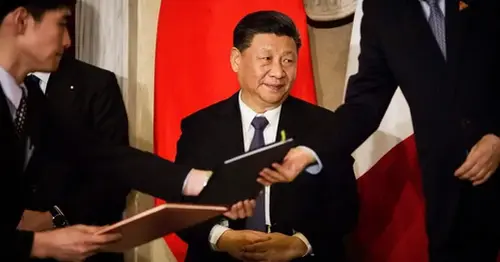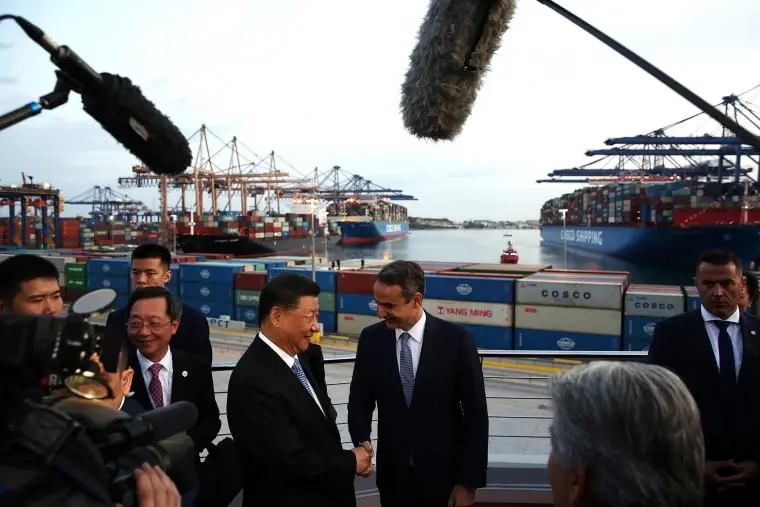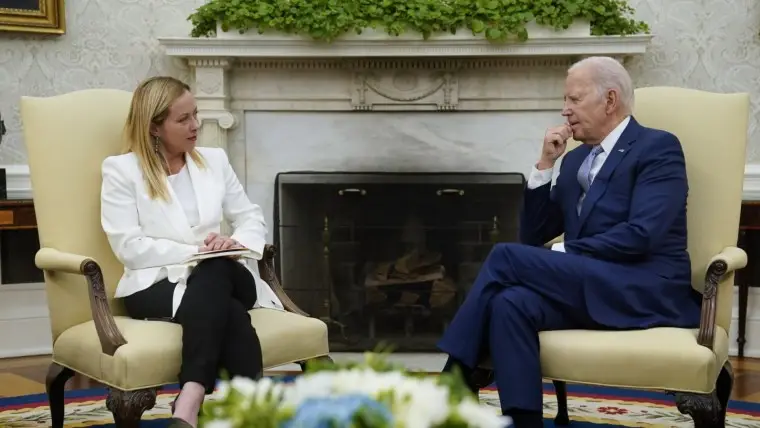
Italy suggests exit of China's Belt and Road in shift toward U.S.
It has long been a sore spot for the Western alliance: Italy, a key partner of the United States, cozying up to China.
But now Rome is trying to back away — without angering the Asian giant 10 times its economic size — and Washington will be watching the balancing act closely as it pushes allies to reimagine their own delicate ties with Beijing.
The U.S. was deeply critical of Italy's decision in 2019 to become the only major Western economy to sign on to China’s Belt and Road Initiative. The BRI, as it’s known, is an unprecedented global infrastructure project that critics see as Beijing’s attempt to gain influence abroad and make smaller countries financially dependent on Chinese investment.
But this week Italy gave its strongest signal yet that it planned to pull out of the project.
Biden, Italian Prime Minister Meloni meet to discuss foreign policy
July 27, 202301:51Signing the deal four years ago was “an improvised and atrocious act,” Italian Defense Minister Guido Crosetto told the Corriere della Sera newspaper on Sunday. “We exported a load of oranges to China, they tripled exports to Italy in three years.”
Crosetto added a more measured coda: “The issue today is, how to walk back without damaging relations? Because it is true that while China is a competitor, it is also a partner.”
These remarks followed months of reports that Italy planned to quit the BRI. Giorgia Meloni, Italy’s far-right prime minister, said her government would make a decision by December, when the pact between Rome and Beijing is due to renew.

Whichever way Rome goes, it has already become a test case for today’s Western dilemma over China: How to continue tapping into the lucrative Chinese market while restricting certain areas, such as microchips, and holding Beijing to account over human rights — all without provoking a backlash.
Four years ago, Italy’s allies “thought we were selling our soul to the devil” by signing up to the BRI, said Filippo Fasulo, an expert in Italian-Chinese relations at the Italian Institute for International Studies, a think tank based in Milan. Today Italy wants to show it is “closely aligned with the U.S., Western camp” while keeping a “stable relationship with China,” Fasulo told NBC News. “The problem is, how to explain that to China?”
China’s hawkish Global Times newspaper on Monday derided the Italian defense minister's comments as resulting from “mounting pressure from the U.S. and the E.U.” as well as Italy's right-wing politics.
“The current government is quite pro-U.S.,” Wang Yiwei, a professor at the Center for European Studies at China's Renmin University, said of Italy. "It's their decision, but we feel regret."
Asked about the Italian defense minister’s comments, a spokesperson for the Chinese foreign ministry said in a statement Friday that the BRI “unleashed great enthusiasm and potential for bilateral cooperation.”
They added that some forces had “launched malicious hype and politicized the cultural exchange and trade cooperation between China and Italy under the Belt and Road framework in a bid to disrupt cooperation and create division.”
Indeed this was the future that successive Italian leaders dreamed of before the country signed up. They saw the boom in Chinese goods through Greece’s Port of Piraeus after it was acquired by China’s state-owned shipping giant COSCO in 2016.

There was also an alluring historical narrative. The BRI is based loosely on the ancient Silk Road trade route, the same that was traversed by the medieval Venetian explorer Marco Polo. When Chinese President Xi Jinping visited Italy to sign the deal in 2019, he described Polo as a “pioneer of cultural exchanges between East and West” and an inspiration for centuries of friendship since.
Though European countries had spoken warmly about the Chinese government in the years previously, by the time Italy inked its deal Western attitudes had begun to turn, with increased scrutiny on China's human rights record and President Donald Trump launching a trade war on Beijing.
At the time, however, Italy’s populist leadership “was a government of inexperienced people,” said Fasulo, the Italy-China expert. “They did not realize in time that the international scenario was changing so fast.”
The outcome — while not quite “a load of oranges” — has not been kind to Italy. Since signing the BRI, Chinese exports to Italy have risen 51%, but Italy's exports to China have gone up only 26%, according to Italian government figures.
Italy’s decision may not only be economic.
Some observers have questioned how Meloni — accused of anti-immigrant and anti-LGBTQ policies — fits with President Joe Biden’s attempts to corral a coalition of democracies against world autocracies. Nevertheless she has made no secret of her desire to be seen by Washington as a reliable partner when it comes to both China and Russia, at a time of swirling questions over the mettle of other powers like France and Germany.
To that end she was in Washington last week, touting her credentials as leader of a "center-right government" and brushing off "false propaganda" about her political leanings, as she told Italy's Sky Tg24, owned by NBC News' parent company Comcast.
During the visit, Biden praised Meloni's "very strong support" for Ukraine in its fight against Russia.
Source: https://www.nbcnews.com/news/world/italy-suggests-exit-chinas-belt-road-shift-us-rcna97230







